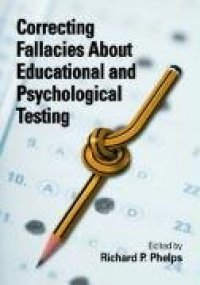
Ebook: Correcting Fallacies about Educational and Psychological Testing
Author: Richard P. Phelps
- Tags: Psychology Counseling Adolescent Applied Child Creativity Genius Developmental Experimental Forensic History Medicine Mental Illness Neuropsychology Occupational Organizational Pathologies Personality Physiological Aspects Psychiatry Psychoanalysis Psychopharmacology Psychotherapy TA NLP Reference Research Sexuality Social Interactions Testing Measurement Health Fitness Dieting Cognitive Behavioral Sciences Science Math Clinical Assessment Education Theory Schools Teaching Educational
- Year: 2009
- Publisher: American Psychological Association (APA)
- Edition: 1
- Language: English
- pdf
Standardized testing is used for diagnosis, selection, and achievement measurement by individuals in many fields, including psychology, education, employment, and professional credentialing. Its benefits are numerous, substantial, and scientifically proven. However, these benefits are not well articulated or well publicized.In their technical communications, measurement specialists are generally positive about the worth of standardized testing. Meanwhile, those who engage public debate, such as journalists and certain special interest groups, tend to be less scientifically informed and more negative about the value of testing. The contributors to this volume contend that most criticisms ignore readily accessible scientific evidence and have the unfortunate effect of discrediting the entire testing enterprise.Standardized testing bears the twin burden of controversy and complexity and is difficult for many to understand either dispassionately or technically. In response to this reality, Richard P. Phelps and a team of well-noted measurement specialists present this book as a platform where they: describe the current state of public debate about testing across fields; explain and refute the primary criticisms of testing; acknowledge the limitations and undesirable consequences of testing; provide suggestions for improving testing practices; and, present a vigorous defense of testing and practical vision for its promise and future.Those who are charged with translating the science of testing into public information and policy - including administrators, social scientists, test publishers, professors, and journalists who specialize in education and psychology - should find a wealth of usable information here with which to balance the debate.
Download the book Correcting Fallacies about Educational and Psychological Testing for free or read online
Continue reading on any device:

Last viewed books
Related books
{related-news}
Comments (0)